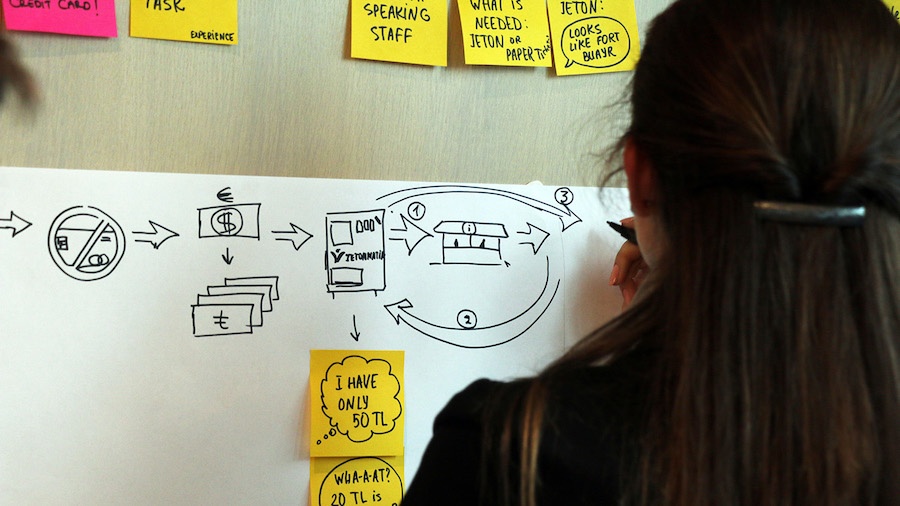The importance of workshops for UX design

On the fourth floor of an Istanbul hotel young men and women are huddled over work tables, overlooking large poster boards, markers, conceptual maps, and scattered notes. The atmosphere is charged.
User experience (UX) has only been present in Turkey in the last couple of years and local expertise is hard to find.
The frontrunners of Turkey’s UX design scene, from startups to the corporate world, are no strangers to workshops like this one. However, a lot of them tend to rely on online tools which the UX field so aptly provides. And for those working in what is a nascent field in Turkey, these platforms prove to be their teachers and mentors.
For this reason, UX designers and product managers take advantage of the opportunity to attend real-time workshops to exchange skills with their colleagues, most of whom were not able to acquire them through formal education.

As such, in May UX Alive! in Istanbul saw a lot of energetic exchanges amongst designers, not least due to the workshops from some of the industry’s biggest players.
The workshops ranged from ecommerce checkout design patterns and customer experience management, to prototyping techniques, customer journey mapping, designing minimum viable products (MVPs), and storytelling. Experts and designers from 21 international companies, including Microsoft, Paypal, Mel Studios, Red Badger, Optimizely and Ordergroove discussed ways in which companies could optimize their user experience.
“Startups and big companies are present here in this room,” said Seyda Ulgen, part of conference organizer Userspots' UX optimization team. They themselves led a workshop on conversion rate optimization, teaching participants how to run usability tests and provided the example of Amazon.
“We asked participants to redesign a website so that it becomes more user friendly,” Ulgen told Wamda. “Our job [UX design] is to make it perfect.”
For Batuhan Dogan, a UX designer at Dugun, online wedding planners, the workshops are a necessity. He is attending this year’s workshops for a second time, taking the time off from work to meet internationally acclaimed designers and learn from them.
Dogan studied mining engineering but decided to pursue UX design soon after graduating. He relied on books to learn, complementing his studying with online courses and Userspots’ meetings and UX summer camps.

After a year, he became a UX designer and landed his job at Dugun. “The UX sector is growing and events like this help companies learn about the importance of UX,” he explained after a two hour morning session. “There are companies that don’t know what UX is and some that know about it but don’t value it.”
The importance of workshops was noted by the organizers.
“Last year participants asked to see more workshops,” explained Mustafa Dalci, founder of Userspots. Not only did they provide two days of workshops, but also a night session at Atolye Labs, the famous studio located inside a former beer factory.
Dogan told Wamda that the workshops allowed him to improve his skills, he was just sad there wasn’t more time - Userspots holds UX trainings all year round, but it is only to these conferences that they invite international speakers.
The workshops successfully matched mentors and students, facilitated collaboration between different companies, and created an environment in which UX designers could grow. Along with Userspots, Turkey’s branch of The User Experience Professional’s Association (UXPA) UXPA Turkey, have been providing resources to UX professionals and organizing gatherings since 2014, all a step in the right direction for the scene.

By bringing together a mix of fields within UX, such as advertising, marketing and designing, participants acquired a comprehensive view of the problems in question.
“This year I have more experience and knowledge so I can ask better questions and get better answers,” Dogan told Wamda, after finishing his session with Hazjier Pourhalkhali, the strategy consultant at Optimizely, on how to implement problem-centric hypotheses. During the workshop, Pourhalkhali presented a case study and asked participants to find ways in which they could improve Turkish Airlines’ website. “This is the only time I can meet people working for some of the best companies [in UX design],” said Dogan.


